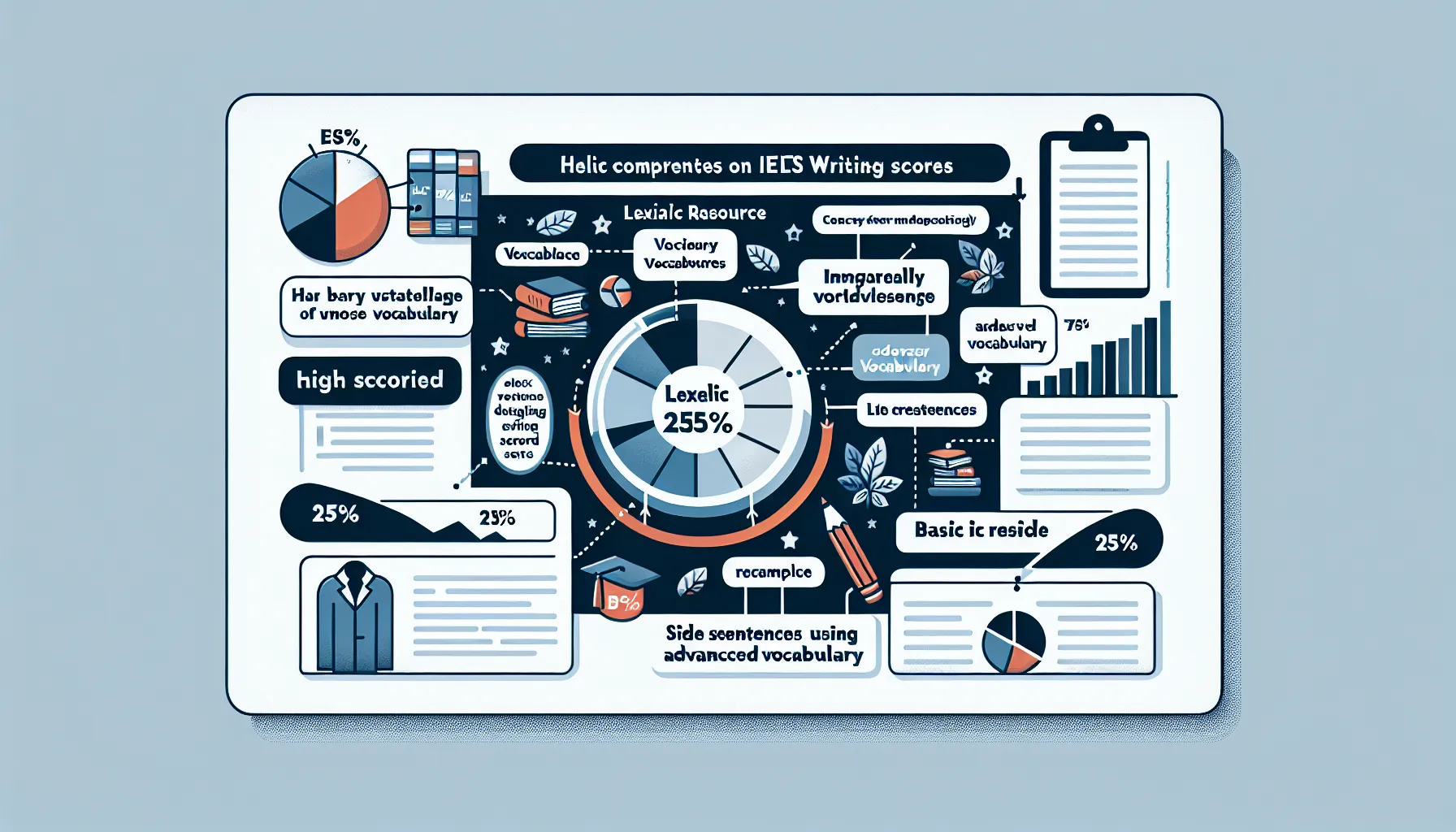Understanding the Importance of Vocabulary in IELTS Writing
Vocabulary plays a crucial role in achieving a high band score in the IELTS Writing test. A rich and diverse vocabulary allows you to express your ideas more precisely and persuasively, demonstrating your language proficiency to the examiner. It’s not just about knowing more words; it’s about using them effectively and appropriately in context.
The Impact of Vocabulary on IELTS Writing Scores
Examiners assess your lexical resource, which accounts for 25% of your writing score. This criterion evaluates the range and accuracy of your vocabulary usage. A wide vocabulary can help you:
- Convey complex ideas more effectively
- Avoid repetition and create more engaging content
- Show nuanced understanding of the topic
- Impress examiners with sophisticated language use

Strategies to Expand Your IELTS Vocabulary
1. Read Extensively on Various Topics
Reading widely is one of the most effective ways to build your vocabulary naturally. Focus on materials that are relevant to IELTS topics, such as:
- Quality newspapers and magazines (e.g., The Economist, National Geographic)
- Academic journals in various fields
- Non-fiction books on diverse subjects
As you read, highlight unfamiliar words and phrases. This active engagement helps reinforce new vocabulary in context.
2. Create a Personal Vocabulary Journal
Maintain a dedicated notebook or digital document to record new words and expressions. For each entry, include:
- The word or phrase
- Its definition
- Example sentences showing usage
- Synonyms and antonyms
- Any collocations or idiomatic uses
Regularly review your journal to reinforce your learning and ensure long-term retention.
3. Use Vocabulary Building Apps and Websites
Leverage technology to make vocabulary learning more engaging and efficient. Some popular options include:
- Quizlet: Create flashcards and play vocabulary games
- Memrise: Learn through spaced repetition and mnemonic techniques
- Vocabulary.com: Practice with personalized vocabulary lists and challenges
These tools can complement your traditional study methods and make learning more interactive and enjoyable.
4. Practice Word Families and Collocations
Understanding word families (related forms of a word) and collocations (words that often appear together) can significantly expand your vocabulary usage. For example:
- Word family: economy, economic, economical, economize
- Collocation: “strong economy” (not “powerful economy”)
Focus on learning words in these groups to enhance your ability to use them correctly in various contexts.
5. Incorporate New Words in Your Writing Practice
Actively use newly learned vocabulary in your IELTS Writing practice. This helps solidify your understanding and makes you more comfortable using these words under exam conditions. Try to:
- Replace basic words with more sophisticated alternatives
- Use a variety of sentence structures to showcase different word forms
- Include idiomatic expressions and collocations where appropriate
Remember, it’s not just about using complex words, but using them accurately and naturally.
Advanced Techniques for Vocabulary Enhancement
1. Thematic Vocabulary Building
Organize your vocabulary learning around common IELTS themes such as environment, education, technology, and health. This approach helps you:
- Build topic-specific word banks
- Understand vocabulary in relevant contexts
- Prepare more effectively for potential essay topics
Create mind maps or thematic lists to visualize connections between related words and concepts within each theme.
2. Analyzing Model Essays and Reports
Study high-scoring IELTS Writing samples to observe how advanced vocabulary is used effectively. Pay attention to:
- Sophisticated word choices
- Varied sentence structures
- Effective use of transitional phrases
- Academic and formal expressions
Try to emulate these techniques in your own writing practice, gradually incorporating similar language patterns and vocabulary.
3. Utilize Corpus-based Learning
Explore corpus tools like the British National Corpus (BNC) or the Corpus of Contemporary American English (COCA) to understand how words are used in authentic contexts. These resources can help you:
- See real-world usage examples
- Understand word frequencies and patterns
- Identify common collocations and phrases
This data-driven approach can significantly enhance your understanding of vocabulary usage in academic and formal writing.
4. Engage in Regular Paraphrasing Exercises
Paraphrasing is a valuable skill for IELTS Writing and an excellent way to expand your vocabulary. Practice rewriting sentences and paragraphs using different words and structures. This exercise:
- Forces you to think of synonyms and alternative expressions
- Improves your ability to explain complex ideas in various ways
- Enhances your overall language flexibility
Start with simpler texts and gradually move to more complex passages as your skills improve.
Common Pitfalls to Avoid
While expanding your vocabulary is crucial, it’s equally important to use it correctly. Avoid these common mistakes:
-
Overusing complex words: Don’t use sophisticated vocabulary just to impress. Ensure your writing remains clear and natural.
-
Neglecting context: Always consider the appropriateness of a word in its context. A word may be formal but not suitable for the specific topic or sentence.
-
Ignoring collocations: Learn how words naturally combine with others to avoid awkward phrasing.
-
Memorizing without understanding: Focus on truly understanding the nuances and usage of new words rather than just memorizing definitions.
-
Lack of practice: Regularly incorporate new vocabulary into your writing to reinforce learning and gain confidence in using these words.
Next Steps: Putting Your Expanded Vocabulary into Practice
Now that you’ve learned strategies to boost your vocabulary, it’s time to put them into action:
- Set a daily goal to learn and practice new words
- Incorporate vocabulary-building exercises into your IELTS study routine
- Write practice essays using your expanded vocabulary and seek feedback
- Take mock IELTS Writing tests to assess your progress
- Join IELTS study groups or forums to share vocabulary tips and resources with other learners
Remember, consistent practice and application are key to mastering vocabulary for IELTS Writing. Stay motivated, track your progress, and celebrate your improvements along the way.
By following these strategies and maintaining a consistent study routine, you’ll be well on your way to expanding your vocabulary and improving your IELTS Writing performance. Remember, vocabulary enhancement is an ongoing process, so stay curious and keep learning even beyond your IELTS preparation.